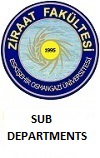General Information
Eskişehir Osmangazi University (ESOGÜ), Faculty of Agriculture was established in 1995, then department of Horticulture was activated in 2006. Department was started the education in 2008-2009 training period on Master of Science grade. Undergraduate education was started in 2011-2012 period, and 2 Professor, 2 Associate Professor, 2 Assistant Professors, 3 Research Assistants were involved in the department.
Our department consists of four disciplines as Grape growing and breeding, Fruit Growing and Breeding, Vegetable Growing and Breeding, and Ornamental Plants Growing and Breeding, and proceeds studies and academic activities on these four disciplines.
Mission
Training agricultural engineers in the field of Horticulture; environmentally sensitive, capable of accessing and synthesizing information on production and cultivation. In terms of scientific research, it is to carry out basic researches that have been integrated with the field, will contribute to regional problems and development, prioritize innovations.
Vision
In the field of horticultural crops displaying sensitive approaches to the problems of our region, region and country as well as universal problems. To become a department that educates technical staff accepted nationally and internationally with its education, and is internationally known for its researches.
Program Mission
For educational approaches, to educate agricultural engineers, sensible to environment in horticultural area, related to sustainable agriculture principles, has the ability of attaining knowledge on the production and growing subjects and utilize it by synthesizing. As for scientific researches, to conduct basic researches that land integration realized, contributing local problems and development, and prioritizing novelties.
Being a department that displaying sensible approaches to horticultural problems of our district, region, and country, besides universal problems, educating technical personal that accepted national and international range, acknowledged internationally by the researches performed.
To train agricultural engineers that responsible to environment, society and people, comprehend the importance of the profession to the society, have basic knowledge and application skills for the sector, with recognition of the importance of lifelong learning, and thus follow and apply scientific and technological developments in agriculture, transmit the information to industry and producers of the region and country, embrace the scientific way of thinking and working for the welfare of mankind.
Employment Opportunities of Graduates
It is possible to get a job in public offices, banks, seed and agricultural pesticide firms, nurseries, factories that process horticultural products, firms work on the storage and conservation of the products, agricultural cooperatives, producers and exporters associations and, quality control and research laboratories, and could make consultancy at various firms.
Besides, different activities as, commercial fruit and vegetable growing, vine growing, arboriculture, seedling cultivation, green house growing, ornamental plants growing, mushroom growing, cold storage management, pesticide, seed, fertilizer production and trade, could be performed.
Educational Objectives
Sensitive to the natural environment, society and people, grasping the importance of the profession for society, having basic knowledge and application skills for the industry, perceived the importance of lifelong learning. therefore, to train agricultural engineers who can follow and apply scientific and technological developments in the field of agriculture, deliver healthy information to the regional and country sectors and producers, adopt scientific thinking and work for the welfare of humanity.
Program Outcomes
1. To have the basic information on horticulture and other agriculture engineering areas, describing the required data to solve the problems, to have the ability of gathering data and solving the problems by using information technology
2. To have theoretical and practical (land and laboratory) information on growing and breeding of fruits, vegetables, grapevine and ornamental plants, and to use and transfer this information accurately
3. To have the ability of determining and evaluating the source of the ecological, biological, technical and economic problems that negatively effects the sufficient yield and quality of horticultural crops
4. To have the skill of utilizing different techniques for sustainable usage and protection of genetic resources in horticultural area and environment
5. To have the ability of describing, classification and growing fruits, vegetables, grapevine and ornamental plants
6. To have the skill of establishing and operating orchards, greenhouses and vineyards
7. To have the information and ability on breeding horticultural crops, developing a new cultivar, and propagation of these new varieties by different methods (seed, seedling, and sapling)
8. To have the skill of using and applying biotechnology on horticulture
9. To have the information on good agricultural practices, and by the way, to decide the right time of cultural practices of the horticultural crops, and to have the ability of describing the pest and diseases of horticultural plants
10. To have the skill on observing the changes through harvest, post-harvest, and storage of horticultural crops, and to have the information on storage conditions
11. To have the ability of getting the data on horticultural area, and evaluation, recording, project creation and application skills
12. To have the ability of working in individual, multiple and different disciplined teams, and having the responsibility
Department Opportunities
Application Areas
At the ESOGÜ Faculty of Agriculture Ali Numan Kıraç Campus;
• There is a collection orchard (apple, pear, plum, cherry, cherry, peach, nectarine) and 10 vegetable parcels consisting of various kinds of soft and stone fruits.
• There is a 500 m2 plastic greenhouse.
In ESOGÜ Faculty of Agriculture, Sarıcakaya-Mayıslar Campus,
• In an area of 40 hectares, there is an orchard consisting of various fruit types. Cherry, pomegranate, olive, plum, fig, peach, apricot, persimmon, and pistachio are some of the species that we grow.
• Olive oil press facility was established in the building of our faculty located in Mayıslar campus and started its activities at the end of 2011.
Due to the climatic conditions of Sarıcakaya-Mayıslar region, it has a microclimate characteristic and has a climate characteristic similar to the Aegean-Mediterranean climate. This situation provides a great advantage in terms of Horticulture.
Research Units
Laboratories





